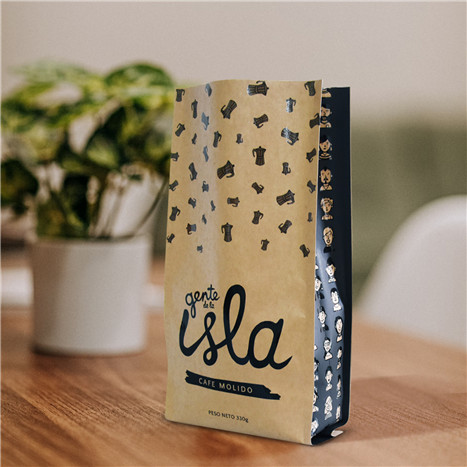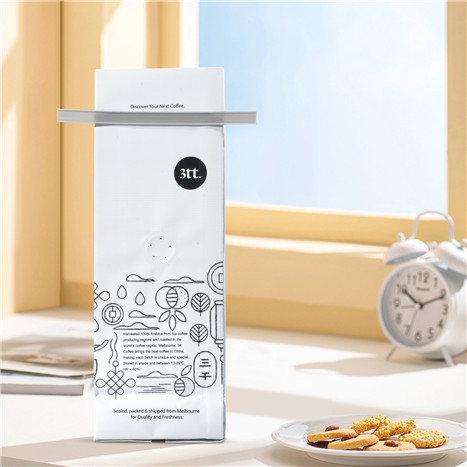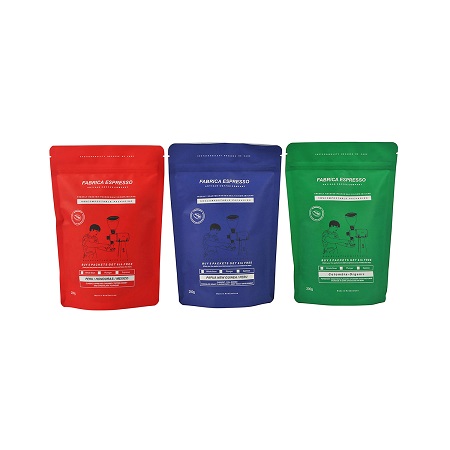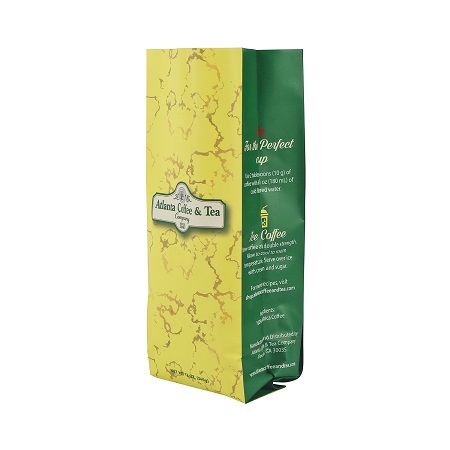Printed coffee bags are designed to not only protect coffee beans but also serve as a branding tool for coffee producers and roasters. There are several different types of materials that can be used in the production of printed coffee bags in the market. The material of all our custom printed coffee bags are high barrier, food safe and can be applied to all kinds of coffee products. Link BIO for a free sample to get our premium printed coffee bags.
Traditional materials: PET/PE PET/VMPET/PE PET/AL/PE OPP/CPP NY/PE PET/NY/PE PET/NY/AL/PE Matt OPP/Kraft Paper/PE | Compostable materials: NK/PBS NK/PBAT NK/Kraft Paper/PBAT NK/Kraft Paper/NKME/PBAT Kraft Paper/PBAT Kraft Paper/NK/PBAT NK/Kraft Paper/PBS NK/NKME/PBS | Recyclable materials: Green PE/EVOH PE PE/EVOH PE Green PE/Green PE EVOH PE EVOH/PCR PE MDO PE/Green PE |
The choice of materials used will depend on factors such as the intended use, the required level of protection, and the desired aesthetic appearance of the bag.
 Check our Quality Control of our printed coffee bags |  Wondering you want to know about our types of printed coffee bags |

Details of some of the most commonly used materials of printed coffee bags:
Plastic is one of the common material used for printed coffee bags, such as polyethylene (PE) and polypropylene (PP). These materials are lightweight, strong, and provide a high-quality barrier against moisture, oxygen, and other contaminants. They are also easy to print on and can be produced in a variety of colors.
Foil is a popular material for printed coffee bags because it provides a high barrier against light, moisture, and oxygen. It also offers a high-quality surface for printing, and it can be produced in a range of different colors and finishes.
Paper is a commonly used material for printed coffee bags due to its cost-effectiveness, versatility, and eco-friendliness. It can be coated with a thin layer of plastic or wax to improve its moisture barrier properties. Paper is also easy to print on and can be produced in a range of different colors and finishes. Kraft paper is known for its strength and resistance to tearing, bursting, and puncturing. It is also widely used in the packaging industry due to its high elasticity, high tear resistance, and good printability.
Biodegradable materials: As sustainability becomes increasingly important, some coffee roasters and producers are switching to biodegradable materials for their printed coffee bags. These materials include plant-based films, bioplastics, and compostable materials. They are designed to break down naturally over time, reducing waste and minimizing the impact on the environment. There are several commonly used materials of printed biodegradable coffee bags. PBAT stands for Polybutylene adipate terephthalate, which is a biodegradable and compostable polyester polymer. PLA (Polylactic Acid): PLA is a bioplastic made from renewable resources like cornstarch or sugarcane. PLA is often used as a barrier layer in biodegradable printed coffee bags. Cellulose is a biodegradable and renewable material that is made from plant fibers such as wood pulp. It is often used as a base layer in biodegradable cool coffee bags.
While PBS (Polybutylene succinate) is a biodegradable and compostable polyester polymer that can be used as a sustainable alternative to traditional plastics. And it is always used for home compostable printed coffee bags.
Also recyclable materials are becoming increasingly important in the packaging industry, and there are several materials that can be used for printed coffee bags that are recyclable. Polyethylene terephthalate (PET): PET is a commonly used plastic material for food packaging, including printed coffee bags. It is a highly recyclable material and can be processed to make new PET products, such as bottles and food containers.
Green PE, also known as bio-based polyethylene, is made from sugarcane ethanol, a renewable and sustainable resource. While EVOH PE, or ethylene vinyl alcohol copolymer, is a high barrier material that is commonly used in food packaging to provide excellent oxygen and moisture barrier properties, preventing spoilage and extending the shelf life of the product. And PCR PE stands for Post-Consumer Recycled Polyethylene. PCR PE is made from recycled plastic material, reducing the amount of waste in landfills and conserving natural resources. And MDO PE (machine direction oriented polyethylene) is a type of polyethylene film that has been stretched in the machine direction during the manufacturing process to improve its properties.
The choice of material for printed coffee bags wholesale depends on factors such as the desired level of protection, the intended use, and the desired aesthetic appearance of the bag. It's important to note that the materials used for printed coffee bags should comply with the regulations and requirements for food packaging to ensure the safety and quality of the product. Click for more about our materials for coffee packaging bags.